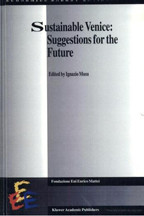Sustainable Venice : Suggestions for the Future

01.02.2001
Ignazio Musu
Kluwer Academic, Series on Economics, Energy, Environment
It is universally recognised that Veniceand its lagoon are of such value
that they constitute an international public good that must be
preserved for humanity as a whole. But such an ambitious task requires a
diversified, sustainable set of economic activities, mostly focused on
the production of services and non-material goods. This complex issue is
analyzed using different approaches, with a discussion of the case of
Venice as an example of some of the most relevant problems concerning
the relation between the environment and development in the contemporary
world: the trade-off between preserving an ecosystem and considering it
as an economic resource; the evolution of different urban growth
scenarios and the preservation of a physical habitat; the role of
immaterial production in urban economic development; the nature of
tourism as a sustainable activity, considered from both the
environmental and cultural angles; the institutional aspect of governing
a process of sustainable urban development.
Contributors: I. Musu, M. Bon, et al., C. Magnani, T.
Pelzel, M. Rispoli, et al., J. Van Der Borg, A.P. Russo, E. Rullani, S.
Micelli, B. Dente et al.
It is universally recognised that Veniceand its lagoon are of such value that they constitute an international public good that must be preserved for humanity as a whole. But such an ambitious task requires a diversified, sustainable set of economic activities, mostly focused on the production of services and non-material goods. This complex issue is analyzed using different approaches, with a discussion of the case of Venice as an example of some of the most relevant problems concerning the relation between the environment and development in the contemporary world: the trade-off between preserving an ecosystem and considering it as an economic resource; the evolution of different urban growth scenarios and the preservation of a physical habitat; the role of immaterial production in urban economic development; the nature of tourism as a sustainable activity, considered from both the environmental and cultural angles; the institutional aspect of governing a process of sustainable urban development.
Contributors: I. Musu, M. Bon et al., C. Magnani, T. Pelzel, M. Rispoli et al., J. Van Der Borg, A. P. Russo, E. Rullani, S. Micelli, B. Dente et al.
